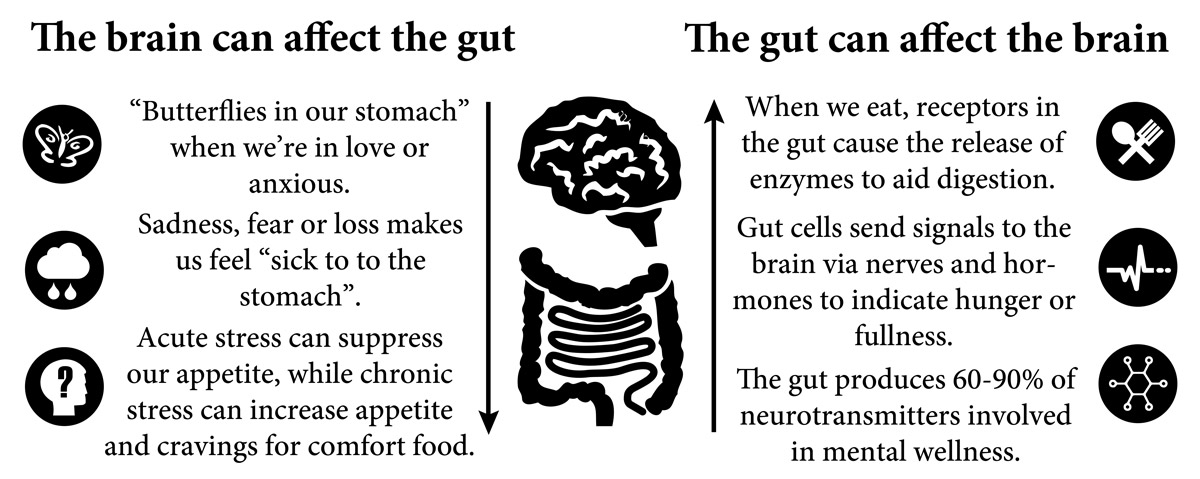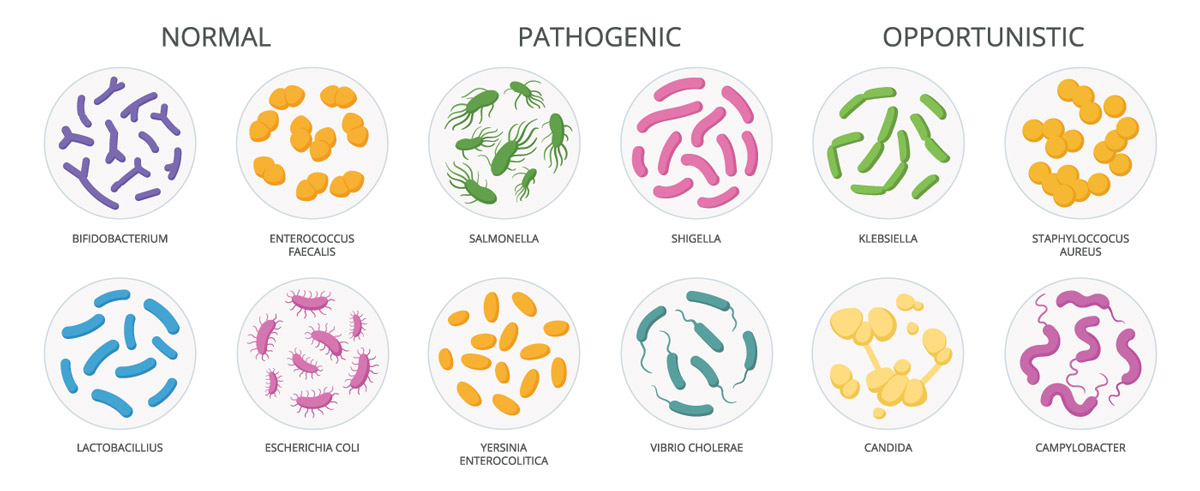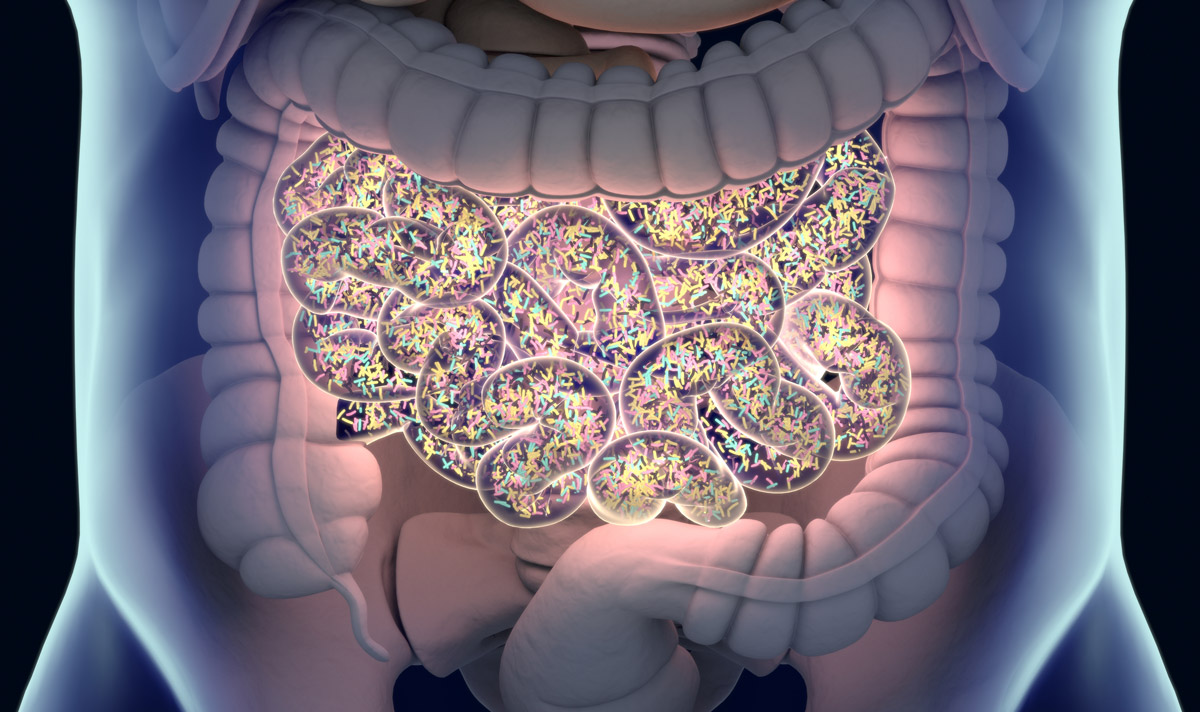Why You Need Probiotics
The importance of a healthy and well-functioning gut cannot be overstated. Many common health symptoms such as brain fog, joint pain, anxiety, depression, mood swings, digestive tract issues, hormone imbalance, fatigue, memory loss, sleep disorders, and poor immune health often begin with poor gut health. Gut (or intestinal) health depends on having a healthy microbiome, which is a community of microorganisms (also called microbes) which include the bacteria, fungi, parasites, and viruses that inhabit our gut.

Our microbiome consists of microbes that are both helpful and those that can be potentially harmful. Most of our gut microbes are “symbiotic” which means that these microbes and our bodies are mutually beneficial, and that each provides the conditions necessary for the other to continue to not only survive, but often to thrive. Some of the microbes that exist in our gut are pathogenic (promoting disease) but others promote and maintain our health.

In a healthy body, pathogenic and beneficial microbes can coexist without causing problems. However, problems can occur when there is an imbalance or excess of the pathogenic gut microbes. As an infant, we are first exposed to these microbes during delivery in our mother’s birth canal, and subsequently through our mother’s breast milk. [1]

We are born without an established microbiome. But as an adult, it is estimated that there are over 100 trillion microbes coexisting in our gut [2][3]. The microbiome of an infant depends solely on the microorganisms that are found in the mother. Subsequently our environmental exposures to microbes and our diet can change our microbiome to be either beneficial to health or place one at greater risk for disease. Taking probiotics, supplements, and making lifestyle changes are the most effective ways to improve our overall beneficial gut flora, while keeping the pathogenic flora in check.
If you have any persistent health issues, and if your daily routine does not include exercising regularly, eating a nutritious diet, getting sufficient sleep, and dealing with stress in a healthy fashion, then you should consider changing your lifestyle first. If these measures do not substantially improve your health problems, it could be a sign that your gut biome is not in balance and that you could benefit from certain supplements and probiotics such as Agrisept-L to promote optimal health.

The digestive system is one of the most vital organs in the human body because it is the first line of defense against chronic disease. Poor gut health is the root cause of many diseases, including heart disease, Crohn’s disease, psoriatic arthritis, diabetes, atopic eczema, and celiac disease. The gut microbiota seems to play a role in the development and progression of obesity. Studies of overweight and obese people show a dysbiosis (gut microbial imbalance) characterized by a lower diversity of gut microbes. [4-12]
Microbes in our gut microbiome stimulate our immune system, break down potentially toxic food compounds into inert components, and synthesize certain vitamins and amino acids, [13][14] including the B vitamins and vitamin K. The enzymes needed for the body to synthesize vitamin B12 are only found in bacteria, and not in plants or animals. [15] That’s why it’s one of the few vitamins given by injection to folks whose bodies are unable to synthesize sufficient health-maintaining quantities of this essential vitamin. Are the microbes in our gut causing us to desire certain foods? Yes. Research has shown that our microbiome can stimulate our appetites (and even the appetites of our pets and farm animals) for eating certain foods that are beneficial to the microbiome. These microbes can even turn our appetite on or off. That is why it is important to have a balance of the ones that can turn our appetite off to prevent over-eating. [16-19]
An imbalance of certain types of harmful intestinal bacteria generates toxins in the large intestines that can contribute to early and accelerated aging. A healthy and balanced gut helps us to stay mentally young and physically active, while a poorly functioning gut can lead to depression, anxiety, dementia, and disease.
How Long Does It Take to Restore Gut Flora?
In many cases, restoring gut flora could be accomplished with a simple change in our diet, while in difficult cases, (such as after the prolonged use of potent antibiotic drugs) it can take up to six months or more to restore your gut’s health by using probiotics, supplements, and by making lifestyle changes. Probiotics can be extremely beneficial in recovering from chronic sickness, and supplements and certain healthy foods can help recover and maintain a healthy gut biome. Probiotics and supplements can reduce inflammation in the intestines and can be a positive step towards regaining a healthy immune system and efficient immunologic response.
Restoring Gut Flora
Probiotics (“pro bios” or Greek: ‘for life’) are live microorganisms, yeasts and bacteria that improve and help to restore the gut flora when it has become disrupted due to poor lifestyle, gastrointestinal diseases, or from long-term use of antibiotics. Probiotics are called “good bacteria”. The bacteria in probiotics are like the bacteria that naturally exist in parts of the human body, including the skin, digestive tract and vagina. The bacteria in your digestive tract help break down particles of food, stimulate your immune system and overwhelm any infectious bacteria that may be present. Vaginal bacteria can make the vagina more acidic, helping to prevent yeast infections such as Candida.

Probiotics alone may not provide you with total relief if you have not adopted a healthy lifestyle. But using probiotics to attain a proper balance of beneficial bacteria is a good start. Certain supplements and foods can create a healthy environment in your gut to maintain a healthy gut microbiome. Foods can be added to your diet such as yogurt made with active bacterial cultures, and tempeh, which naturally contains probiotics; and probiotics can be added to other types of foods to enhance your diet as well. There is also an excellent supplement available, Agrisept-L, which is natural and effective in restoring our beneficial gut flora while keeping candida and other unhealthy microorganisms in check.
Supplement to Restore Gut Health
The supplement, Agrisept-L is an all-natural, non-toxic supplement, having no known side effects. It consists of 100% citrus seed extracts: grapefruit, tangerine, lime, and lemon seed extracts in a base of vegetal glycerin and is formulated to maintain the flora and bacterial balance in the body to promote an overall sense of wellness. Grapefruit Seed Extract (GSE) may fight the inhibitors of weight loss such as molds and candida albicans (a detrimental yeast). Agrisept-L rids the body of viruses, bacteria, fungus, and parasites and can kill the influenza virus on contact.

Agrisept-L is an antiseptic, an anti-rheumatic, a bactericide, a fungicide, and an antioxidant. The main active agents contained in citrus extracts are limonene, coumarins, flavonoids, and Vitamins A, B, B1, and B2. Citrus seed extracts were used in the past as natural antibiotics prior to the commercial availability of modern chemical antibiotics. Agrisept-L has been used as a tonic for the liver and the pancreas. Citrus seed extracts help to decrease gastric (reflux), can combat the bacteria (Helicobacter Pylori) that causes ulcers, and can combat certain forms of bacteria that can trigger some types of arthritis and rheumatism. It also helps to recover more quickly from common ailments or fight them off altogether such as intestinal problems like diarrhea, turista, infections, and can even address allergies.
The nutritional support provided by Agrisept-L assists the body to fight conditions even beyond the Digestive system:
Parasites
Herpes (internally)
Herpes (topically)
Athlete’s foot
Warts
Adverse reaction to pets
Vaginal yeast infections such as Candida
Insulin resistance, sugar cravings, and type 2 diabetes [are all linked to type 2 diabetes.
Periodontal disease and gingivitis
Cholesterol levels that are too high
Dermatitis with acne
Infections of the upper respiratory tract (such as the common cold)
Seasonal allergies
SIBO (small intestinal bacterial overgrowth)
Agrisept-L comes in liquid form and can be used whether the infection is on the skin, in the ears, nose, or mouth or in the gastrointestinal tract.
In liquid form, this supplement is good for rinsing surface toxins from fruits and vegetables, fish, poultry, and meat. Simply add 10 drops to 8 ounces of water and use it to wash your fruits and vegetables. Agrisept-L can also be used as a facial cleanser to help prevent acne. Applied on insect bites, acne, athlete’s foot and warts, it provides welcomed relief.
Recap of Suggested Uses for Agrisept-L®:
Citrus seed extracts are beneficial for Candida Albicans, Sore Throats, Influenza, Gingivitis, Skin and Nail Fungus, Athlete’s Foot, Parasites, Poison Ivy, and Dermatoses (non-inflammatory skin conditions), and in drinking water Agrisept-L is excellent for cleaning fruits and vegetables, rinsing fish, poultry, and meats, for use in fish aquariums, in pet water dishes, and in humidifiers.
Precautions for Agrisept-L:
As a precautionary note, Grapefruit seed extract (GSE), which is one of the citrus seed ingredients in Agrisept-L, can deplete normal flora (good bacteria) in the gut if used long-term (daily, over several months). If you plan to take Agrisept-L daily, then after several weeks you can take a probiotic supplement two hours before each dose. Common medications that may interact with grapefruit and potentially grapefruit seed extracts include blood thinners, statins, drugs that treat abnormal heart rhythm, and antihistamines. Grapefruit inhibits certain enzyme systems within the body most often involved in drug metabolism (called cytochrome P-450) [20] which increases blood concentrations of the drug, creating a risk of overdose and dose-dependent adverse effects.
Recovery Plan
If your lifestyle isn't conducive to enhancing your general wellness, it's time to take a closer look at your daily behaviors that may hinder your recovery from any long-standing health issues. These key lifestyle modifications can help improve your gut health and overall quality of life.

Get Enough Sleep
Sleep is essential for healing from disease or other long-term health problems. Experts recommend that you have at least eight to nine hours of unbroken sleep each night, while the precise quantity will vary slightly depending on your age and circumstances.
Eliminate the use of blue light at night to improve your sleep, as it reduces the generation of melatonin, the hormone that helps falling to sleep. [21] If you can't take your eyes off your TV, phone, or tablet, use a blue-light filter to counteract the stimulating effects of blue light.
Sleeping with a white-noise machine or fan can help reduce sleep disturbances by masking any background noise. Finally, to avoid overheating and interrupting your deep sleep, put your thermostat between 60 and 67 degrees Fahrenheit.
Consume a Healthy Diet
One of the most important adjustments you can make to improve your overall health is to modify your diet. Eliminating inflammatory foods [22], controlling blood sugar levels, and finding the correct carbohydrate and prebiotic balance will help address chronic health concerns.

A good place to start is with the Paleo diet, which is less stringent than many others. It promotes the use of healthy fats such as avocados, salmon, olive oil, and nuts while avoiding processed sugars, certain carbohydrates, and all processed foods. Many people notice a difference in their symptoms after just a few weeks on this diet. Whatever diet you choose, it's critical that you stick with it for two to three weeks before deciding whether it's right for you. If you feel better after eliminating certain foods from your diet, try reintroducing them to see if you can pinpoint your own food intolerances, allergies, and triggers.
When reintroducing foods to your diet, keep in mind that you should only do it one food at a time. This will allow you to keep an eye on your body for any symptoms that may appear within the next one to two days. If you don't have any symptoms when reintroducing a certain food, it's most likely not a trigger. However, if you start noticing any gastrointestinal or other symptoms, you should consider eliminating that food from your diet.
Stress Reduction
Stress appears to be a regular companion in our everyday lives due to our hectic modern lifestyles. However, research reveals that stress is linked to various chronic health disorders and symptoms, and full recovery typically necessitates lowering your stress levels.

Stress hormones, such as cortisol, are activated by chronic stress and impair your mood, sleep, stomach, and immune system. If you're having trouble reducing your stress levels on your own and have developed depression, consult a therapist. If you are under continual stress and want a natural way to address stress and elevated cortisol levels, we suggest you also try our product Laminine, which has been clinically proven to reduce cortisol levels and reduce depression [23].
Physical Activity
Get active and receive the rewards of consistent exercise. Experts recommend getting at least two to three hours of physical activity per week, so start with rapid walking, stationary bicycle riding, or swimming. Whatever activity you choose, make sure it's one you'll be able to maintain so you can reap the full health advantages of regular exercise.

Agricept and Probiotics
Take Agricept-L and Probiotics to keep your gut flora balanced. Be sure to fully follow the directions listed on the product label.
Professional Advice
If you are unsuccessful in treating your chronic health concerns find a healthcare practitioner to support you, such as a licensed Nutritional Advisor or a functional medicine specialist. Chronic health problems rarely have a "quick remedy."




